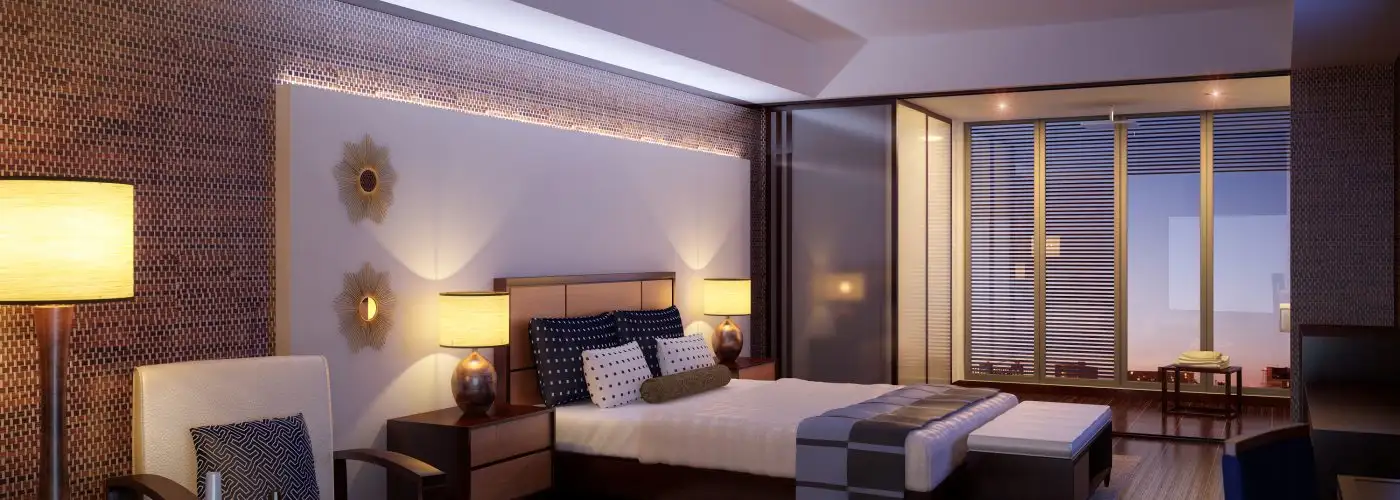Rattling ice machines. Dinging elevators. Bachelorette parties down the hall. The sleep gods have their work cut out for them if you’re expecting to snooze well while staying at a hotel.
We’ve compiled one of the most comprehensive guides available to sleeping in a hotel, covering everything from what you should ask when you’re booking the room to how you can swiftly take care of noisemakers so you can get back to sleep.
When Making Your Reservation
1. Ensure that you get a quiet room. Two requests that are absolutely vital and pretty widely known when selecting your hotel room: a room on an upper floor and away from the elevators.
2. Book a room midway down a hallway. This is generally the quietest part of the floor, as it’s away from the ice and vending machines, guest laundry facilities, exits, housekeeping closets, and other places where noise can be made.
3. Ask for a room on the concierge or suite level, if the hotel has one. Sometimes those rooms have taller ceilings, giving you a little more air space from the people above you.
4. Avoid rooms facing a pool. While the view might be pretty, pools can be late-night gathering places—despite posted closing times—and noise echoes off water.
5. Ask what time the trash is collected if there are dumpsters or recycling bins outside your windows. If the time is too early for your liking, get a different room.
6. Request a room at the back of a low-rise hotel. They are generally quieter (especially if they’re away from the parking lot). Even if the view is poor, the peace is worth it.
7. Get a room at least two or three levels above banquet rooms, bars, or other public spaces if the hotel has them. You’d be surprised how many floors a pulsating and thumping bass beat can penetrate.
8. Ask if the hotel is undergoing or has recently completed renovations. Usually these are done in segments—a floor or section at a time. You want to avoid floors that are adjacent to those currently being updated. But you do want to be on a floor that has finished being renovated—which will usually be cleaner, smell better, and have newer beds and linens.
9. Inquire whether guestrooms have blackout shades. These are the heavy, thick curtains that keep the light out, and you want to have them.
10. Make sure yours is a non-smoking room. If you’re not a smoker, the scent of old cigarette smoke will keep you from feeling at ease (awake or asleep).
11. Ask about pillow options. If you’re vulnerable to neck or back pain from using the wrong pillow, find out if pillows with different levels of firmness are available. Some hotels stock firmer ones in guestroom closets, or have a secret stash at the front desk. If the hotel doesn’t offer what you need, consider bringing yours from home.
12. Request two beds if you’re traveling with a friend. You’ll get a more peaceful night’s sleep if you snooze alone than you will if you bunk with someone you’re not accustomed to being next to.
Packing for Your Stay
13. Pack earplugs. Uncomfortable as they can be, wadding little bits of foam in your ears is far less annoying than being kept up all night by noise. Better yet, invest in Bose’s Noise Masking Sleepbuds which play soothing sounds to cancel out noise and let you sleep. You can also bring your own travel-size white noise machine, download a white noise app onto your smartphone, or stream white noise from your laptop on a free website like SimplyNoise.com.
14. Bring an eye mask. They are for your eyes what earplugs are for your ears—and they’re especially important if your room doesn’t have blackout curtains. Look for ones that are contoured so they don’t restrict your eye movements during deep sleep.
15. Pack a sleep sack if you tend to worry about the cleanliness or comfort of your hotel linens. They also are helpful for folks with skin sensitivities who are worried about the detergents or bleach used to clean hotel linens.
16. Spray your room. The chemicals used to clean hotel rooms or launder sheets can be a little overpowering. Add your own scent with a spritz or two of a gentle linen spray you bring from home. (Consider one with a lavender scent, which is known to be soothing; here’s one travel-size option from Amazon.)
Preparing to Hit the Hay
17. Don’t read, eat, or work in bed. Admittedly, this is not always possible, as seating can be limited in a hotel room. But try not to use your bed to do anything but sleep.
18. Don’t eat a large or overly rich dinner late at night. A belly that’s churning away digesting a big meal interferes with your ability to sleep soundly.
19. Abstain from alcohol. Although alcoholic beverages can help you fall asleep faster, even a moderate dose of alcohol right before bed can cause your sleep quality to suffer.
20. Sip tea. A small cup of chamomile tea or other warm, non-caffeinated beverage can induce sleep. Don’t drink too much though, or else you’ll need to get up in the middle of the night to use the bathroom.
21. Silence your cell phone notifications, especially if you’re in a different time zone than your friends and family. People could be trying to contact you when you’re trying to sleep. Turn off notification sounds for texts, emails, and calls before you go to bed so you’re not disturbed.
22. Take a melatonin. This supplement mimics the natural hormone that your body produces to go to sleep. According to Dr. Aleksandar Videnovic, Principal Investigator at Massachusetts General Hospital’s Sleep Center, “Melatonin helps our body recognize when it’s time to sleep, and it can be very helpful in alleviating symptoms of jet lag.”
Just Before Bed
23. Hang the “do not disturb” sign on the outside doorknob. This is especially important if you’re planning to sleep in. Some housekeepers start their service at 8 a.m. or earlier. If your room doesn’t have a “do not disturb” sign, request one from the front desk.
24. Set backup wakeup calls. How many times have you set an unfamiliar alarm clock, only to wake up the next morning in a rush because it never went off (or awakened in the middle of the night worrying it wouldn’t work)? For greater peace of mind, use two alarms—such as the hotel’s wakeup call service, your cell phone, a wristwatch, or a travel-sized alarm clock. Even if you’re not using the hotel’s alarm clock, check it to make sure the previous occupant of the room didn’t set it to go off at an early time.
25. Take a warm bath. The relaxation can help you sleep better.
26. Adjust the room temperature. According to Sleep.org, most people sleep best in temperatures between 60-70 degrees.
27. Read a non-suspenseful paper book or magazine. Avoid the TV, smartphones, and laptops, as they emit an artificial blue light that can have a stimulating rather than soporific effect. An e-ink e-reader, like the Kindle Paperwhite is a travel-friendly way to read without blue light.
28. Try a meditation exercise that’s designed to induce sleep. There are plenty of apps out there (such as headspace) that will guide you through nighttime meditations to help you relax.
Once in Bed
30. Breathe deeply. Being out of your element can be stressful. Take some deep, slow breaths before bed to help you relax and unwind tense muscles.
31. Don’t wait to report noise. Hotel rooms have notoriously thin walls, and your neighbors may not realize their conversations are crystal clear to you. Sometimes a quick pound on the wall will do the trick to quiet down a noisy neighbor. (See: When the Hotel Guest Next Door Won’t Shut Up.) If you’re not comfortable doing so, just ring the hotel front desk. They’ll phone the guest or send security personnel to the room with a warning. Excessive noise or repeated warnings could result in the guest being asked to leave.
32. Ask to move rooms. All hotels should give a guest the option of relocating to a quieter room if uncontrollable noise—such as traffic, a humming ice machine, or the elevator—is persistent. Of course, it’s not exactly peaceful to have to pack up your belongings and relocate in the middle of the night, and the hotel might be sold out. But if you’re staying in a hotel for multiple nights, this could be an ideal solution.
33. Get out of bed if you can’t sleep. This is a good all-around rule, for traveling or at home. Rather than tossing and turning, get out of bed, turn on a low light, and read a mindless magazine until you’re ready to try again.
More from SmarterTravel:
- 12 Hotel Hacks That Will Save You Money
- How to Find a Clean Hotel Room
- Ditch the Hotel: 10 Cheaper Ways to Stay
- 6 Lies Your Hotel Might Tell You
Editor’s note: This story was originally published in 2017. It has been updated to reflect the most current information.
We hand-pick everything we recommend and select items through testing and reviews. Some products are sent to us free of charge with no incentive to offer a favorable review. We offer our unbiased opinions and do not accept compensation to review products. All items are in stock and prices are accurate at the time of publication. If you buy something through our links, we may earn a commission.
Related
Top Fares From
Today's Top Travel Deals
Brought to you by ShermansTravel
12-Night Peru Escorted Tour, Incl. Sacred...
Wingbuddy
 vacation
$2198+
vacation
$2198+
Amsterdam to Copenhagen: Luxe, 18-Night Northern...
Regent Seven Seas Cruises
 cruise
$12399+
cruise
$12399+
Ohio: Daily Car Rentals from Cincinnati
85OFF.com
 Car Rental
$19+
Car Rental
$19+















